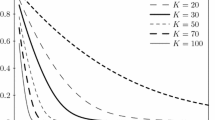Abstract
In cognitive radio networks, an initiating secondary user senses a channel that is unused by a primary user and then makes use of the idle channel. An ongoing secondary user still needs to sense when a primary user accesses its channel and then either moves to another idle channel or moves to a buffer. In the latter case, the secondary user’s call waits in the buffer until either a channel becomes available or a predefined maximum waiting time expires. In this letter, an analysis of reconnection opportunity is presented for the queued secondary calls in the buffer in a cognitive radio network under unreliable sensing through developing a 3-D Markov process, where the unreliable sensing is modeled by different false alarm and misdetection events for both initiating and ongoing secondary users. A closed-form expression of the reconnection probability for an arbitrary secondary call in the buffer is obtained and the numerical computation is provided to highlight the analysis.
Similar content being viewed by others
References
Haykin S. (2005) Cognitive radio: Brain-empowered wireless communications. IEEE Journal on Selected Areas in Communications 23: 201–220
Van Trees, H. L. (2001). Detection, estimation and modulation theory: Part I. New York: Wiley.
Tang S., Mark B. L. (2009) Modeling and analysis of opportunistic spectrum sharing with unreliable spectrum sensing. IEEE Transactions on Wireless Communications 8: 1934–1943
Gao, Y., & Jiang, Y. (2010). Performance analysis of a cognitive radio network with imperfect spectrum sensing. In Proceedings of the 2010 IEEE Infocom on Computer Communications Workshops (pp. 1–6). San Diego, CA, Mar.
Cheng, W., Zhang, X., & Zhang, H. (2011). Imperfect full duplex spectrum sensing in cognitive radio networks. In Proceedings of the 3rd ACM Workshop on Cognitive Radio Networks (CoRoNet’11), Las Vegas NV, Sep.
Castellanos-Lopez, S., Cruz-Perez, F., & Hernandez-Valdez, G. (2011). Performance of cognitive radio networks under resume and restart retransmission strategies. In Proceedings of the IEEE 7th International Conference on Wireless and Mobile Computing, Networking and Communications (WiMob’11) (pp. 51–59). Oct.
Xie, R., Yu, F., & Ji, H. (2011). Dynamic resource allocation for heterogeneous services in cognitive radio networks with imperfect channel sensing. In Proceedings of the IEEE Globecom’11 (pp. 1–5). Dec.
Tang, S., & Mark, B.L. (2007). Performance analysis of a wireless network with opportunistic spectrum sharing. In Proceedings of the IEEE Globecom’07, Washington, D.C., USA, Nov.
Jin, J., & Li, B. (2010). Cooperative resource management in cognitive WiMAX with femto cells. In Proceedings of the IEEE Infocom’10 (pp. 1–9). San Diego, CA, Mar.
Author information
Authors and Affiliations
Corresponding author
Rights and permissions
About this article
Cite this article
Tang, S. Reconnection Analysis for a Cognitive Radio Network with Unreliable Sensing. Wireless Pers Commun 69, 299–305 (2013). https://doi.org/10.1007/s11277-012-0574-x
Published:
Issue Date:
DOI: https://doi.org/10.1007/s11277-012-0574-x




